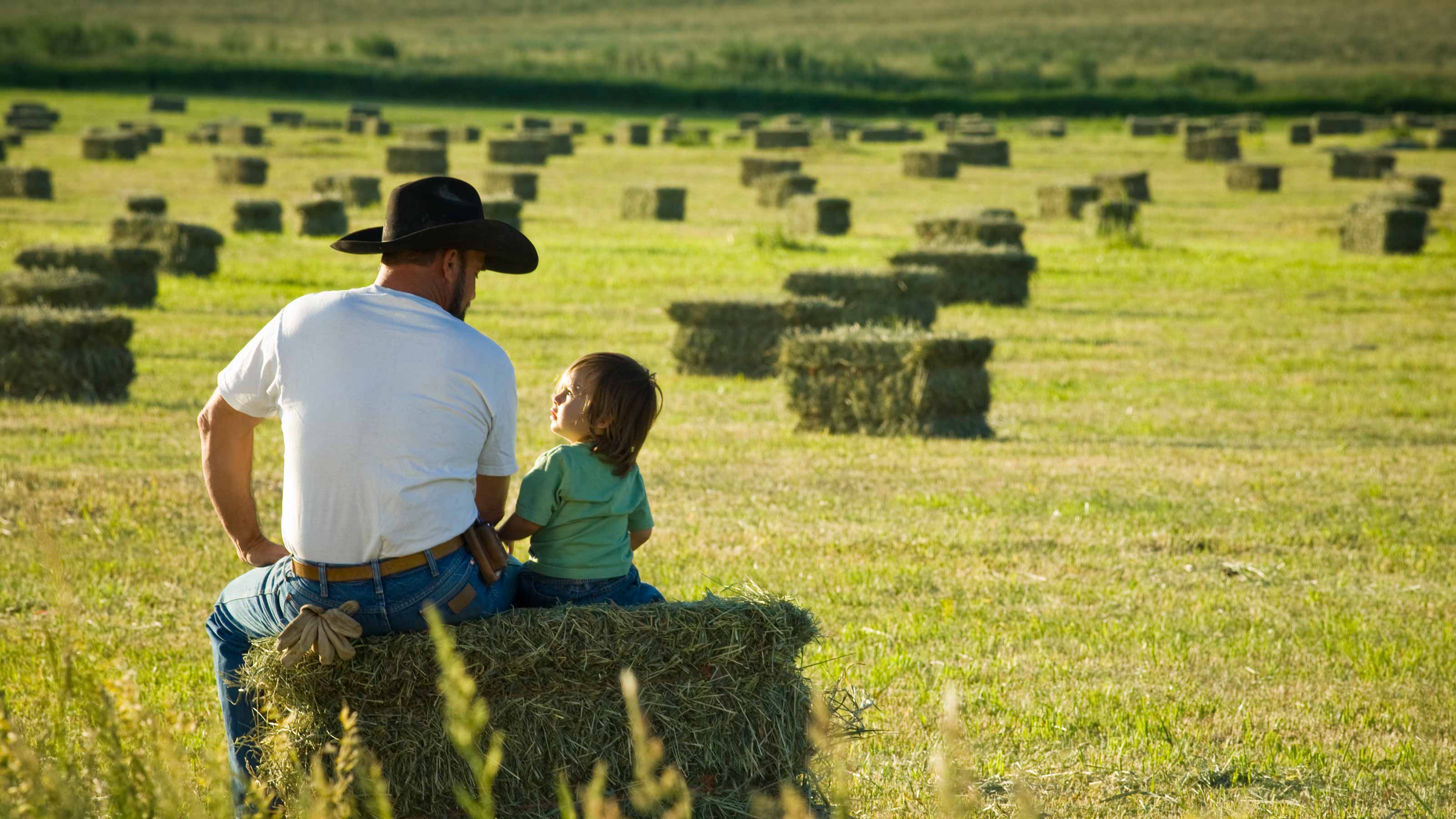Succession Plans for Farmers (Whether Your Kids Want the Farm or Not)
Legacy planning for farmers comes with some interesting challenges and opportunities.


Profit and prosper with the best of Kiplinger's advice on investing, taxes, retirement, personal finance and much more. Delivered daily. Enter your email in the box and click Sign Me Up.
You are now subscribed
Your newsletter sign-up was successful
Want to add more newsletters?

Delivered daily
Kiplinger Today
Profit and prosper with the best of Kiplinger's advice on investing, taxes, retirement, personal finance and much more delivered daily. Smart money moves start here.

Sent five days a week
Kiplinger A Step Ahead
Get practical help to make better financial decisions in your everyday life, from spending to savings on top deals.

Delivered daily
Kiplinger Closing Bell
Get today's biggest financial and investing headlines delivered to your inbox every day the U.S. stock market is open.

Sent twice a week
Kiplinger Adviser Intel
Financial pros across the country share best practices and fresh tactics to preserve and grow your wealth.

Delivered weekly
Kiplinger Tax Tips
Trim your federal and state tax bills with practical tax-planning and tax-cutting strategies.

Sent twice a week
Kiplinger Retirement Tips
Your twice-a-week guide to planning and enjoying a financially secure and richly rewarding retirement

Sent bimonthly.
Kiplinger Adviser Angle
Insights for advisers, wealth managers and other financial professionals.

Sent twice a week
Kiplinger Investing Weekly
Your twice-a-week roundup of promising stocks, funds, companies and industries you should consider, ones you should avoid, and why.

Sent weekly for six weeks
Kiplinger Invest for Retirement
Your step-by-step six-part series on how to invest for retirement, from devising a successful strategy to exactly which investments to choose.
Many farmers are facing a critical retirement decision. The traditions of yesterday are often changing, and their children may no longer want to follow in their parents’ footsteps. The challenges are many. However, there are options available.
In 1971, I began my farming career at the tender age of 9 in the Skagit Valley, 60 miles north of Seattle. Crop farming was my gig; rouging spinach, sorting tulips, picking strawberries, raspberries and cucumbers alongside the migrant workers from Mexico. When I was old enough, I was driving picking machines with a dozen kids lying on boards over a conveyor belt, or driving an open tractor pulling a green pea combine while traveling about 1 mile in four hours.
Today, at the age of 59, I realize that I’ve been preparing this article for 50 years. During 12-hour shifts on the open tractor, it rained, often. My family could not afford proper rain gear, so a plastic lawn bag with holes punched out for my head and arms provided quite well. Working six of these shifts every seven days gives a teenager time to reflect. That’s when I decided farming was very hard and I wanted an easy office job someday!
From just $107.88 $24.99 for Kiplinger Personal Finance
Become a smarter, better informed investor. Subscribe from just $107.88 $24.99, plus get up to 4 Special Issues

Sign up for Kiplinger’s Free Newsletters
Profit and prosper with the best of expert advice on investing, taxes, retirement, personal finance and more - straight to your e-mail.
Profit and prosper with the best of expert advice - straight to your e-mail.
Challenges for Farmers Today
A huge debt of gratitude is owed to the men and women who feed the world. You face unprecedented challenges:
- Mother Nature
- Inconsistent commodity prices
- Lack of access to labor
- Global competition with lower costs of operations
- Lack of resources to compete with larger corporate farming technology
- Next-generation (family) choosing a different career path
- You are at an age where you need to slow down or retire completely
- Potential income tax law changes
- Inheritance and estate taxes influencing the next generation
- Lack of experienced financial advisers within the local community
Here are some important points to consider. Many farms are owned by baby boomers, commonly defined between 58 and 76 years old. For the first time in history, the majority of farmers’ children are not destined to follow the family tradition. Instead, they often opt for careers outside the challenging world of farming. Secondly, farmers tend to be land rich and cash poor. On paper, their net value is high, but cash flow can be seasonal. If a farmer sells acreage, they often lose their economies of scale, potentially making it difficult to remain competitive.
Most farms have been passed down from generation to generation. However, many farmers do not currently have an exit strategy for their heirs, and children no longer feel obligated or have the passion to carry on the legacy of the family farm.
Succession Plans
Farm succession plans can provide for assets to flow to children or outside entities. Each of these options has benefits and detriments. There are tax implications whether the farm is sold to a family member, or a non-family entity.
Under current law, you can use Section 1031 in the Internal Revenue Code to defer or eliminate income taxes. If you own a farm and do not have an exit strategy involving your children taking over the farm, you probably want to care for your children and grandchildren in the future, regardless. Many people have heard of Section 1031 exchanges, but do not wish to manage real estate as part of their retirement plan.
There is, however, a way to sell your farm and defer capital gains tax using a Section 1031 called the Delaware Statutory Trust (DST). The rules on eliminating your capital gains and creating an income strategy for life are very specific. First of all, it is important to partner with a Qualified Intermediary to execute a Section 1031 exchange. Then, if you don’t want to be a landlord, you work with a licensed, competent financial adviser to exchange your property for passive income.
The exchange process allows you to invest in a diversified portfolio without the necessity of becoming a landlord. You can potentially receive monthly distributions and participate in your share of the newly purchased real estate’s appreciation. For an in-depth explanation, please read I'm a Landlord: Can I Ever Truly Retire?
5 Options for Farming Families
Here are your options if you own a farm and prefer to keep the property in the family.
- Sell the farm to a child in your family.
- Leave the farm to children in your will or living trust.
- Multiple children: Split between farmers and non-farmers.
- Multiple children: Split among the children who all want to farm.
- Keep the land even though none of your children want to farm. You have an emotional attachment to the farm and wish to keep it in the family.
If you sell your farm to your children, you’ll likely have a very low “cost basis,” meaning there may be a large income tax bill due either at the time of sale or over time if the farm is sold on an installment contract. There is no step-up in basis under this type of arrangement.
A step-up in basis is a method used for calculating the value of a property that your children will inherit. Instead of using the value of the property at the time of purchase (say $100,000), they can use the value of the property at the time of death (say $1 million) and thus avoid income taxes on the increased value.
If your children inherit the farm from you, there may be a step-up in basis. Make sure you consult with your estate planning attorney here. In 41 common law states, there is only a one-half step-up upon each parent passing, in nine community property states (Arizona, California, Idaho, Louisiana, Nevada, New Mexico, Texas, Washington and Wisconsin), there is a double step-up. For instance, Jane inherited her farm in 1970 when it was worth $200,000. It’s now worth $2 million. If she sells or gifts the farm, someone will be on the hook for a $1.8 million taxable gain someday. If her heirs inherit the farm, the new cost basis will be $2 million, meaning nobody will ever owe income taxes on the gain.
Let’s say farmer Jones has four children: Two wish to continue in the family tradition, and two do not. One option is to use permanent life insurance to fund the non-farming children’s inheritance. The farm is left to the heirs wanting to continue operating the farm, and monetary compensation is provided for the two children who do not wish to work the farm. This can be set up using a trust to protect the assets and reduce the chance of sibling in-fighting.
What if all four of farmer Jones' children want to continue in the business? Siblings don’t always agree on important decisions – or little ones for that matter. If this could be an issue, the family farm is placed in a family trust, and a “trustee” makes the decisions, instead of leaving them to the children to fight things out.
Perhaps none of your children want to farm, but you want to keep the land as a legacy asset. In this case, you can leave your farm to your trust with a trustee to oversee the process. The land can be leased and the net proceeds distributed to your heirs generationally.
If you own a farm, these are some possible scenarios for your succession and retirement plan. Using existing tax laws, such as utilizing Section 1031 exchanges using Delaware Statutory Trusts, farmers can pass their life’s work on to their loved ones and avoid sharing the much of the appreciation with Uncle Sam.
Profit and prosper with the best of Kiplinger's advice on investing, taxes, retirement, personal finance and much more. Delivered daily. Enter your email in the box and click Sign Me Up.

Brian Evans, CPA/PFS is the owner of Madrona Financial Services and Bauer Evans CPAs, a well-known registered investment advisory practice and an accounting firm based out of Seattle, Washington. He serves as their Chief Executive Officer, lead Wealth Planner and Senior Portfolio Manager. Evans also hosts a weekly radio show and podcast, Growing Your Wealth, in Washington on KTTH, KIRO, KNWN and KVI, and on KNRS in Utah.
-
 Betting on Super Bowl 2026? New IRS Tax Changes Could Cost You
Betting on Super Bowl 2026? New IRS Tax Changes Could Cost YouTaxable Income When Super Bowl LX hype fades, some fans may be surprised to learn that sports betting tax rules have shifted.
-
 How Much It Costs to Host a Super Bowl Party in 2026
How Much It Costs to Host a Super Bowl Party in 2026Hosting a Super Bowl party in 2026 could cost you. Here's a breakdown of food, drink and entertainment costs — plus ways to save.
-
 3 Reasons to Use a 5-Year CD As You Approach Retirement
3 Reasons to Use a 5-Year CD As You Approach RetirementA five-year CD can help you reach other milestones as you approach retirement.
-
 The 4 Estate Planning Documents Every High-Net-Worth Family Needs (Not Just a Will)
The 4 Estate Planning Documents Every High-Net-Worth Family Needs (Not Just a Will)The key to successful estate planning for HNW families isn't just drafting these four documents, but ensuring they're current and immediately accessible.
-
 Love and Legacy: What Couples Rarely Talk About (But Should)
Love and Legacy: What Couples Rarely Talk About (But Should)Couples who talk openly about finances, including estate planning, are more likely to head into retirement joyfully. How can you get the conversation going?
-
 How to Get the Fair Value for Your Shares When You Are in the Minority Vote on a Sale of Substantially All Corporate Assets
How to Get the Fair Value for Your Shares When You Are in the Minority Vote on a Sale of Substantially All Corporate AssetsWhen a sale of substantially all corporate assets is approved by majority vote, shareholders on the losing side of the vote should understand their rights.
-
 How to Add a Pet Trust to Your Estate Plan: Don't Leave Your Best Friend to Chance
How to Add a Pet Trust to Your Estate Plan: Don't Leave Your Best Friend to ChanceAdding a pet trust to your estate plan can ensure your pets are properly looked after when you're no longer able to care for them. This is how to go about it.
-
 Want to Avoid Leaving Chaos in Your Wake? Don't Leave Behind an Outdated Estate Plan
Want to Avoid Leaving Chaos in Your Wake? Don't Leave Behind an Outdated Estate PlanAn outdated or incomplete estate plan could cause confusion for those handling your affairs at a difficult time. This guide highlights what to update and when.
-
 I'm a Financial Adviser: This Is Why I Became an Advocate for Fee-Only Financial Advice
I'm a Financial Adviser: This Is Why I Became an Advocate for Fee-Only Financial AdviceCan financial advisers who earn commissions on product sales give clients the best advice? For one professional, changing track was the clear choice.
-
 I Met With 100-Plus Advisers to Develop This Road Map for Adopting AI
I Met With 100-Plus Advisers to Develop This Road Map for Adopting AIFor financial advisers eager to embrace AI but unsure where to start, this road map will help you integrate the right tools and safeguards into your work.
-
 The Referral Revolution: How to Grow Your Business With Trust
The Referral Revolution: How to Grow Your Business With TrustYou can attract ideal clients by focusing on value and leveraging your current relationships to create a referral-based practice.